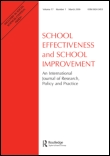
SCHOOL EFFECTIVENESS AND SCHOOL IMPROVEMENT
Scope & Guideline
Unlocking the potential of schools with innovative research.
Introduction
Aims and Scopes
- Educational Effectiveness Research:
The journal explores the determinants of school effectiveness, including leadership, teaching quality, and organizational characteristics, providing a comprehensive understanding of how these factors influence student achievement. - Equity and Inclusion in Education:
It addresses issues of equity within educational systems, examining how socioeconomic and demographic factors impact student performance and opportunities, particularly in diverse and underprivileged contexts. - School Improvement Strategies:
The journal focuses on strategies and practices for school improvement, assessing the effectiveness of various interventions and models aimed at enhancing educational quality and outcomes. - Teacher Effectiveness and Professional Development:
Research on teacher quality, professional learning communities, and the impact of teacher training programs is central to the journal, highlighting how teacher effectiveness contributes to overall school success. - Assessment and Accountability:
The journal investigates the role of assessment systems in measuring educational effectiveness and accountability, including the implications of school value-added models and inspection outcomes.
Trending and Emerging
- Impact of Socioeconomic Factors:
There is an increasing focus on how socioeconomic composition affects student outcomes, emphasizing the need for context-sensitive strategies to address educational inequities. - Resilience and Academic Success in Diverse Contexts:
Research is trending towards understanding the factors that contribute to academic resilience, particularly in majority-minority schools and low-achieving environments. - Collaborative and Distributed Leadership Models:
Emerging studies highlight the significance of collaborative and distributed leadership practices in enhancing school effectiveness, shifting away from traditional top-down models. - Longitudinal and Dynamic Approaches to School Improvement:
There is a growing interest in longitudinal studies that assess the sustainability of school improvement initiatives over time, indicating a move towards understanding long-term impacts. - Integration of Technology and Data in Education:
The use of technology and data analytics in monitoring and improving educational outcomes is becoming more prominent, reflecting the need for evidence-based practices in schools.
Declining or Waning
- Traditional Assessment Methods:
There appears to be a decline in research focused solely on traditional assessment methods, as newer approaches and more holistic evaluations of student learning are gaining traction. - Narrowly Defined School Leadership Studies:
While school leadership remains a crucial topic, studies that focus narrowly on specific leadership styles without considering broader contextual factors are becoming less prominent. - Static Models of School Effectiveness:
Research utilizing static or one-dimensional models to assess school effectiveness is waning, reflecting a shift towards more dynamic and context-sensitive approaches that account for variability. - Single-Factor Analyses:
There is a noticeable reduction in studies that analyze the effects of single factors on school performance, as the field increasingly embraces multi-faceted and systemic analyses. - Overly Prescriptive Improvement Frameworks:
Research that promotes prescriptive frameworks for school improvement without considering local contexts and stakeholder involvement is becoming less common.
Similar Journals

DDS-Die Deutsche Schule
Advancing Educational Insights for a Global AudienceDDS-Die Deutsche Schule is a distinguished academic journal published by WAXMANN VERLAG GMBH, focusing primarily on educational research and practices within German schools. Since its transition to Open Access in 2021, the journal has aimed to enhance the accessibility of valuable research findings, fostering a global exchange of ideas among researchers, educators, and policy-makers. With its ISSN 0012-0731, DDS serves as an essential resource in the field of education, providing a platform for scholarly articles that explore innovative pedagogical approaches, curriculum development, and educational policy. The journal not only contributes to the academic discourse but also emphasizes practical implications for teaching and learning in contemporary educational settings. Researchers and practitioners from diverse backgrounds will find DDS to be a vital tool for advancing their understanding and engagement with the evolving educational landscape.
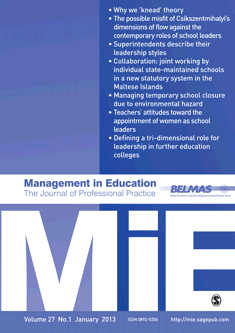
MANAGEMENT IN EDUCATION
Navigating the Challenges of Education with Strategic InsightMANAGEMENT IN EDUCATION, published by SAGE Publications Ltd, stands as a pivotal journal in the fields of education and management, with a focus on the intricate interplay between management practices and educational outcomes. Since its inception in 1987, this esteemed journal has cultivated a reputation for addressing critical issues in educational leadership, strategic management in schools, and policy reforms, making it a vital resource for researchers, educators, and policymakers alike. With an impact factor reflecting its influence in the educational sector, it is ranked in the Q2 quartile in both Education and Strategy & Management categories for 2023. The journal’s Scopus rankings position it favorably within the social sciences, highlighting its contributions to educational management research. Readers can explore cutting-edge studies and theoretical advancements that illuminate best practices in educational environments, making it an indispensable source for enhancing educational effectiveness. For those engaged in the ongoing dialogue about the future of education management, MANAGEMENT IN EDUCATION provides a wealth of insights and research that are not only academically rigorous but also practically relevant.

International Journal of School & Educational Psychology
Shaping Educational Practices with Evidence-Based ResearchThe International Journal of School & Educational Psychology, published by Taylor & Francis Ltd, is a premier academic journal dedicated to advancing the fields of educational and developmental psychology. With an ISSN of 2168-3603 and E-ISSN 2168-3611, the journal has been a valuable resource since its establishment in 2013, with contributions to the field continuing through 2024. The journal's commitment to rigorous research is evident in its Q2 ranking in both Developmental and Educational Psychology and Education categories in 2023, as well as its notable Scopus rankings, placing it in the top 25% of educational journals. Although it does not offer open access options, the journal provides an essential platform for disseminating high-quality research that enriches the understanding of psychological principles in educational contexts. Targeting researchers, professionals, and students alike, the International Journal of School & Educational Psychology strives to highlight innovative methodologies, practical applications, and theoretical discussions that shape educational practices and foster optimal learning environments.

SCHOOL PSYCHOLOGY REVIEW
Shaping the Future of Educational Psychology Through ResearchSCHOOL PSYCHOLOGY REVIEW, published by Taylor & Francis Inc, is a premier academic journal dedicated to advancing the field of psychology, particularly in developmental and educational contexts. With its E-ISSN of 2372-966X, this journal provides a platform for innovative research and discussion surrounding critical issues in school psychology, making significant contributions to both theory and practice. With an impressive Q1 ranking in both Developmental and Educational Psychology and Education categories for 2023, it stands out among over 1,500 journals in its field, showcasing its commitment to high-quality scholarship. Although not an Open Access publication, SCHOOL PSYCHOLOGY REVIEW remains pivotal for researchers, educational professionals, and students seeking to deepen their understanding of psychological principles applied in educational settings. Join a community at the forefront of research, and explore articles that inform practice and policy in school psychology through this highly regarded journal.

LEARNING ENVIRONMENTS RESEARCH
Cultivating Knowledge for Effective Learning SpacesLearning Environments Research, an esteemed journal published by SpringerNature, occupies a pivotal position in the fields of Education, Communication, Developmental and Educational Psychology, and E-learning. With an ISSN of 1387-1579 and an E-ISSN of 1573-1855, this journal has demonstrated its scholarly impact, boasting a Q1 ranking in key categories according to the 2023 metrics. Its Scopus rankings further underscore its relevance, placing it in the top 10% of journals in Communication and 90th percentile among journals in Developmental and Educational Psychology. Learning Environments Research is dedicated to advancing the understanding of learning environments through innovative research and critical analysis, providing a platform for scholars, educators, and practitioners to explore effective educational practices. While currently not offered as an open-access publication, researchers can access a wealth of knowledge that reflects contemporary issues and research trends in education, ultimately fostering improved learning experiences worldwide. The journal’s ongoing commitment to excellence in research and its international perspective make it a valuable resource for anyone seeking to deepen their understanding of learning environments.
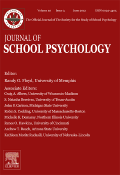
JOURNAL OF SCHOOL PSYCHOLOGY
Empowering Educators with Evidence-Based InsightsJOURNAL OF SCHOOL PSYCHOLOGY, published by PERGAMON-ELSEVIER SCIENCE LTD, is a premier journal that aligns itself at the forefront of educational and developmental psychology. With an ISSN of 0022-4405 and an E-ISSN of 1873-3506, this journal has been a significant contributor to the field since its inception in 1963. It has established itself as a leading source of research and insights, boasting a remarkable reputation with a Q1 ranking in both Developmental and Educational Psychology and Education for 2023, positioning itself within the top tier of SCOPUS indexed journals. Researchers, educators, and practitioners benefit from its rigorous studies that explore the psychological dimensions of education and student behavior, fostering an enriching dialogue on important educational issues. Although it does not currently offer open access, the journal is well-regarded, with impactful research that serves to advance academic discourse and inform best practices within the educational community. Positioned in the United Kingdom, it caters to a global audience, inviting submissions that push the boundaries of our understanding of school psychology.

Profesorado-Revista de Curriculum y Formacion de Profesorado
Elevating Teacher Training through Accessible ResearchProfesorado-Revista de Curriculum y Formacion de Profesorado is a prominent academic journal dedicated to advancing the fields of curriculum studies and teacher education. Published by the esteemed Universidad de Granada's Grupo Investigación FORCE, this Open Access journal has been fostering scholarly communication since 1998, ensuring that research is easily accessible to a global audience. With an ISSN of 1138-414X and an E-ISSN of 1989-6395, it is a respected voice in the education community, currently rated Q3 in Education for 2023, showcasing its relevance and contribution to the discipline. The journal encompasses a wide range of topics related to pedagogy, curriculum development, and teacher professional development, aiming to provide innovative insights and promote best practices among educators. Its Scopus ranking reflects its standing in the field, placing it at #793 out of 1543 in the Social Sciences - Education category, in the 48th percentile, indicating a competitive niche within academic research. Based in Granada, Spain, this journal plays a crucial role in bridging educational theory and practice, making it an essential resource for researchers, practitioners, and students committed to enhancing educational experiences.
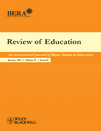
Review of Education
Elevating educational practices through high-quality research.Review of Education, published by WILEY, is a leading journal dedicated to advancing the field of education through rigorous research and scholarly discourse. With an ISSN of 2049-6613, this esteemed journal is recognized for its exceptional quality, reflected in its 2023 Q1 category ranking in Education and standing within the top 68th percentile in Scopus' Social Sciences - Education category. Established to foster innovation and critical thinking, the journal promotes the dissemination of high-impact research that informs policy, practice, and theory in the education sector. As part of its commitment to accessibility, it operates through traditional publication channels, making it a vital resource for educators, researchers, and policymakers alike. With an ambitious scope covering contemporary educational practices and future trends from 2013 to 2024, Review of Education remains at the forefront of educational research, providing a platform for transformative ideas that shape learning environments worldwide.

Educational Assessment Evaluation and Accountability
Fostering impactful dialogue on assessment and evaluation.Educational Assessment, Evaluation and Accountability is a prestigious academic journal published by Springer Heidelberg, situated in the Netherlands. With an ISSN of 1874-8597 and an E-ISSN of 1874-8600, this journal is dedicated to advancing the field of educational assessment by disseminating high-quality research on evaluation practices, accountability measures, and their implications on educational institutions. Recognized as a leader in education and organizational behavior, it proudly holds the Q1 quartile ranking in both the fields of education and human resource management, reflecting its influence within the academic community. The journal is indexed in Scopus, ranking #64 out of 1543 in the Education category and #25 out of 230 in Organizational Behavior, placing it in the 95th and 89th percentiles respectively. Researchers, educators, and policymakers will find the journal's emphasis on practical implications of assessment and evaluation vital for enhancing educational outcomes and accountability practices. With its ongoing publication since 2009 and a focus extending through 2024, Educational Assessment, Evaluation and Accountability continues to serve as an essential resource for fostering rigorous dialogue and knowledge-sharing in the evolving landscape of education.
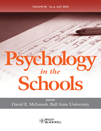
PSYCHOLOGY IN THE SCHOOLS
Inspiring Change in Schools Through Psychological ResearchPsychology in the Schools, published by Wiley, is a leading journal that explores the dynamic intersection of psychology and educational practices, significantly contributing to the fields of Developmental and Educational Psychology and Education. Since its inception in 1964, this esteemed journal has provided a platform for researchers, educators, and practitioners to disseminate innovative findings and theoretical advancements, fostering a deeper understanding of psychological principles in school settings. With an impressive Q2 ranking in Developmental and Educational Psychology and a Q1 ranking in Education as of 2023, it ranks within the top tiers of academic journals, reflecting its impact and relevance in contemporary discourse. Although it does not offer an Open Access option, those interested in pioneering research and practical applications in educational psychology will find invaluable resources and insights within its pages. As the journal continues to evolve towards its 60th anniversary in 2024, it remains committed to addressing the needs and challenges faced by students and educators alike, making it an essential resource for anyone invested in the psychological aspects of education.